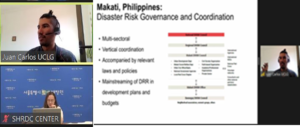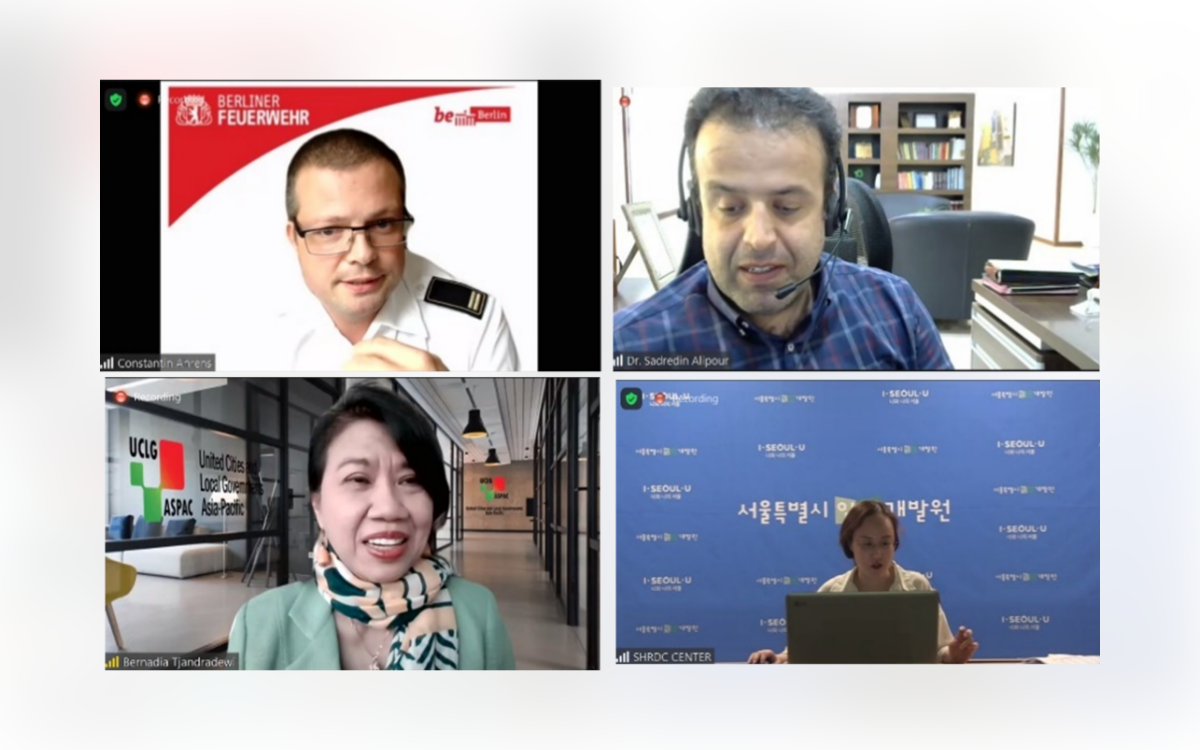9, 16, 23 September 2021 | UCLG ASPAC, in collaboration with UCLG, Metropolis, and Seoul Human Resource Development Centre (SHRDC) as Metropolis International Training Institute (MITI) headquarter, organised a 2021 Online Training Programme on Resilient. This training also implemented the Resilience Modules on the localisation of the Sendai Framework, developed by UCLG and supported by its regional sections, i.e. UCLG ASPAC, in partnership with the United Nations Office for Disaster Risk Reduction (UNDRR) and the United Nations Human Settlements Program (UN-Habitat), which aims to support local authorities in the creation of an enabling environment for disaster risk reduction (DRR) and resilience building.
The training was conducted in three sessions: (i) Fundamentals of Resilient Governance (9 September 2021); (ii) Learning from Cities (16 September 2021); and (iii) Cross-Cutting Strategies for Social Resilience (23 September 2021). The training had caught the attention many stakeholders across the world. After the selection process conducted by the SHRDC, there were 38 trainees from various regions and cities participating in this training.
Session 1 Fundamentals of Resilient Governance Thursday, 9 September 2021
On the first day, the training focused on exploring the Learning module which enables interactive learning on fundamental knowledge for local governments: Knowing and understanding risks; having effective governance mechanisms and organisation; mobilising limited financial resources; and developing future-looking strategies and action for resilient development. The training focused on how these different elements interact and affect decision-making. Through an interactive role-playing game, participants were able to reflect on how to effectively integrate risk-based planning into local governments’ policy cycle.
 The first session let the trainees to experience what they learned in the form of “Futurilities” dynamic exercise: a governmental role-play game which consists of City Mayor, Head of Employment, Head of Environment, Head of Health Services, and Head of Finance. All participants actively discussed to express their opinions of each role, to choose the future plot of their role city.
The first session let the trainees to experience what they learned in the form of “Futurilities” dynamic exercise: a governmental role-play game which consists of City Mayor, Head of Employment, Head of Environment, Head of Health Services, and Head of Finance. All participants actively discussed to express their opinions of each role, to choose the future plot of their role city.
Session 2 Learning from Cities Thursday, 16 September 2021
The second session of the training took form of a webinar that explored and discussed experiences of Metropolis members. They shared testimonies and experiences, together with experts who provided tools to contribute to the creation of policies for a more resilient metropolitan space. This webinar also invited speakers from different cities to broaden the resilience perspective of the trainees: (i) Mr. Constantin Ahrens, liaison officer to the Berlin fire brigade, Senate Department for the Interior and Sport from Berlin; (ii) Dr. Sadredin Alipour, CEO of Waste Management Organisation: the KAP project from Tehran Municipality; and (iii) Mr. Evrim Yavuz and Ms. Melis Bayraklı, Istanbul Metropolitan Municipality (IMM)’s Directorate of Earthquake and Geotechnical Investigation from Istanbul Metropolitan Municipality.
The presented case of 1) ‘Shock’ Response in the Blackout in Berlin back in 2019, 2) the waste management system in Tehran, and also 3) the mitigation of earthquakes and tsunamis in Istanbul allowed participants to learn that there are many aspects need to be looked upon to be resilience.
There was also discussion between the trainees and the speakers discussing main things to consider to ensure incorporation of resiliency aspect in the policy making process, including the use of ‘smart-city’ concept, social resilience, collaboration, and data-sharing between stakeholders.
The Secretary General of UCLG ASPAC, Dr. Bernadia Irawati Tjandradewi put emphasis on advanced and better preparation as the United Nations reported that natural disasters are occurring three times more often than in 1970s and 1980s (50 years ago). She also mentioned that collaboration is key factor to resilience. She encouraged participants to optimise the opportunities presented in the 2021 Online Training Programme to collaborate more to achieve resilience.
Session 3 Cross-Cutting Strategies for Social Resilience Thursday, 23 September 2021
The third session was focused on the effort of resilience-building that goes beyond infrastructure and spatial planning, and not reinforce existing climate and environmental risks. For this dynamic session, UCLG Learning built a methodology on the strategy of Amsterdam and participants were asked to consider the role of social, cultural, and economic policies for a comprehensive resilient action plan.
The session discussed fundamentals of resilience-building and DRR, general overview of the four fundamentals of resilience-building and DRR and its example of application by several Local and Regional Governments. Four lecture points were presented with a few case examples from a few different countries to give an understanding of the cross-cutting nature of social, cultural, and economic aspects in building and enhancing social resilience. One of the major points emphasised was to leave no one behind. The last two major points went over the topic of utilising culture as a pillar for resilience and how fostering resilient local economic development could help enhance social resilience. The last part of this section discussed the application of the “Doughnut Economy” model as a tool for building resilience. This model could be used to identify the boundaries of the actions taken to the path of resilience, so that those actions would neither overshoot the ecological boundaries nor the social minimum boundaries.
The last section of this training was an exercise regarding actions for social resilience using MURAL. Participants were grouped and assigned to different departments (Office for Social Services and Inclusion, Office for Culture, Sports and Community, Office for Economic Promotion, and Office of Environment and Sustainability) discuss a certain issue from the perspective of their respective departments. Each group was then expected to present one action proposal from their departments to intervene issue discussed in the plenary session.
CLICK HERE to access the Resilience Module











